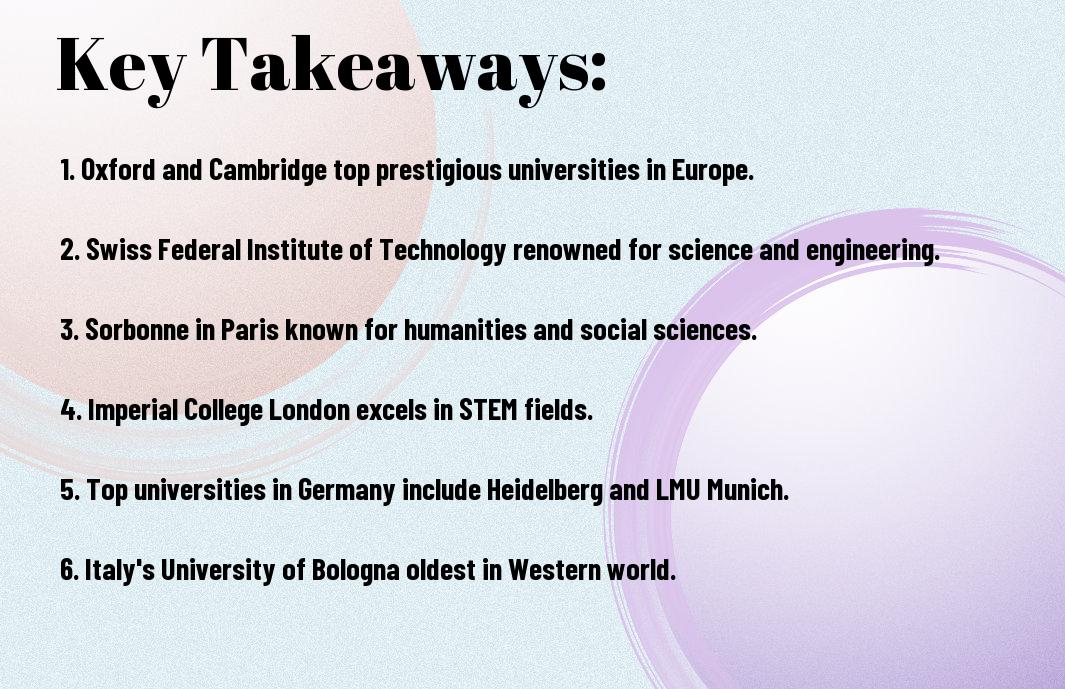Exploring the most prestigious in Europe universities unveils a world of academic excellence and tradition. One can’t help but be intrigued by the rich histories and cutting-edge research that define these institutions. For those seeking top-tier education, a guide to the best international universities in Europe can be immensely valuable. Delve into the rankings and reputations of these esteemed schools to discover where your academic journey might take you. For more insights on the subject, check out What are the best international universities in Europe for….

History of European Universities
The Origins of European Higher Education
European higher education has a rich history that dates back to the Middle Ages. The first universities in Europe were established in Italy, with the University of Bologna, founded in 1088, considered the oldest university in the Western world. These early institutions were primarily focused on the study of law, medicine, theology, and philosophy, reflecting the intellectual pursuits of the time.
Evolution of University Systems
Origins of the European university systems can be traced back to the guilds of the medieval period. These guilds, associations of craftsmen or merchants, laid the foundation for the university as a self-governing community of scholars. Over time, universities evolved and expanded across Europe, playing a crucial role in the development of knowledge and the dissemination of ideas.
During the Renaissance and Enlightenment periods, European universities became centers of learning and innovation, attracting scholars and students from all over the world. The university system continued to evolve, with new disciplines and teaching methods being introduced, shaping the modern academic landscape.
Rankings and Accreditation
Even in the highly competitive landscape of European universities, rankings and accreditation play a crucial role in determining the prestige and quality of an institution.
International University Rankings
Rankings provide a way to compare universities on a global scale by evaluating various factors such as research output, academic reputation, and international diversity. Institutions like the QS World University Rankings and the Times Higher Education World University Rankings are widely recognized for their comprehensive assessment methodologies.
Accreditation Bodies and Standards
Accreditation is a process by which universities undergo external evaluation to ensure they meet certain quality standards set by accrediting bodies. For European universities, bodies like the European Association for Quality Assurance in Higher Education (ENQA) and the European Quality Assurance Register for Higher Education (EQAR) play a significant role in maintaining and enhancing educational standards across the continent.
To attain accreditation, universities must demonstrate their commitment to providing high-quality education and research opportunities to students. This process not only validates the institution’s credibility but also helps in attracting talented faculty and students from around the world.
Factors Affecting University Rankings
- Academic reputation and research output are key factors in determining university rankings.
- International outlook and diversity of faculty and students also influence a university’s global standing.
Any fluctuations in these factors can impact a university’s position in international rankings, highlighting the importance of consistently maintaining high standards in education and research.
This comprehensive evaluation of rankings and accreditation sheds light on the rigorous standards upheld by the most prestigious universities in Europe. By adhering to these criteria, institutions strive to not only maintain their esteemed reputations but also continue to excel in providing world-class education to a diverse student body.
Top Universities in Europe
University of Oxford, UK
For centuries, the University of Oxford in the United Kingdom has been synonymous with academic excellence and prestige. With its beautiful historic buildings and rich tradition, it is no wonder why this institution is considered one of the best in the world.
Students who attend Oxford can expect to be challenged intellectually and surrounded by some of the brightest minds in their field. The university’s rigorous academic programs and world-class faculty ensure that graduates are well-equipped for success in their careers.
University of Cambridge, UK
Any discussion about prestigious universities in Europe would be incomplete without mentioning the University of Cambridge in the United Kingdom. Like its counterpart Oxford, Cambridge has a long and illustrious history of producing top scholars and researchers.
This revered institution offers a wide range of programs in various disciplines, providing students with a well-rounded education that prepares them for the challenges of the modern world. With state-of-the-art facilities and a supportive academic community, it’s no surprise that Cambridge continues to attract some of the brightest minds from around the globe.
ETH Zurich, Switzerland
Cambridge may be renowned for its academic excellence, but ETH Zurich in Switzerland is equally impressive in science, technology, engineering, and mathematics (STEM). This leading European university is known for its cutting-edge research and innovative approach to education.
Switzerland’s commitment to innovation and research is evident in ETH Zurich’s collaborative and interdisciplinary programs. The university’s strong ties to industry and emphasis on practical skills make it an excellent choice for students looking to make a real-world impact in their chosen field.
École Polytechnique Fédérale de Lausanne (EPFL), Switzerland
To further illustrate Switzerland’s reputation for academic excellence, École Polytechnique Fédérale de Lausanne (EPFL) stands out as a top-tier institution in the country. With a focus on science, engineering, and technology, EPFL is at the forefront of research and innovation in Europe.
Polytechnique Fédérale de Lausanne (EPFL) offers a vibrant campus environment where students can engage with cutting-edge research and collaborate with leading experts in their field. The university’s strong links to industry ensure that graduates are well-prepared for the demands of the global job market.
University of Geneva, Switzerland
University of Geneva in Switzerland is another esteemed institution that has earned its place among the top universities in Europe. With a history dating back to the 16th century, this university has a long-standing reputation for excellence in teaching and research.
Lausanne’s location in the heart of Europe provides students with unique opportunities for cultural enrichment and academic exploration. The university’s commitment to diversity and innovation ensures that students receive a well-rounded education that prepares them for success in a rapidly changing world.
Academic Excellence
Once again, European universities prove their academic excellence through various avenues.
Research Opportunities and Facilities
On the forefront of academic achievements are the research opportunities and state-of-the-art facilities available at these prestigious universities. They offer cutting-edge laboratories, libraries stocked with extensive resources, and collaborations with industry partners, providing students and faculty with the tools necessary to conduct groundbreaking research.
Faculty and Student Profiles
Faculty members at these universities are highly accomplished in their fields, often leading experts in their respective areas. They not only excel in their academic pursuits but also actively engage with students, fostering a supportive learning environment. The student body is diverse, consisting of bright minds from across the globe, creating a dynamic intellectual community.
With a strong emphasis on academic rigor and innovation, these universities attract top scholars and researchers in various disciplines. The faculty members are not only passionate educators but also active contributors to their fields, publishing influential research and collaborating with peers worldwide. This dedication to excellence enriches the academic experience for students and creates a culture of continuous learning and growth.
Interdisciplinary Programs and Collaborations
Interdisciplinary collaborations are a hallmark of these prestigious universities, where boundaries between traditional academic disciplines are blurred to foster innovation and creativity. Students and faculty are encouraged to think outside the box, engaging in interdisciplinary research projects and programs that tackle complex global challenges from multiple perspectives.
Interdisciplinary collaborations at these universities extend beyond academic boundaries, involving partnerships with leading institutions, industry leaders, and policymakers. This network of collaborators provides students and faculty with unique opportunities to apply their knowledge in real-world settings, making meaningful contributions to society. These programs not only enhance the academic experience but also equip students with the skills necessary to address complex issues in an increasingly interconnected world.

Campus Life and Student Experience
Campus Facilities and Infrastructure
Not only are the prestigious universities in Europe known for their academic excellence, but they also boast state-of-the-art facilities and infrastructure to enhance the overall student experience. From modern lecture halls equipped with the latest technology to advanced research laboratories and extensive libraries, students have access to all the resources they need to excel in their studies.
Life on campus is further enriched by green spaces, sports facilities, and student support services, creating a conducive environment for learning and personal growth.
Student Organizations and Clubs
Facilities for extracurricular activities play a crucial role in shaping the student experience at prestigious European universities. These institutions offer a wide range of student organizations and clubs catering to diverse interests, from academic and cultural groups to sports teams and social societies. Participating in these extracurricular activities not only fosters a sense of community and belonging but also helps students develop leadership skills and expand their networks.
Student organizations and clubs provide a platform for students to pursue their passions outside the classroom, promoting holistic development and creating lasting memories of their university years.
Cultural and Social Events
Life at Europe’s most prestigious universities goes beyond academics, with a vibrant calendar of cultural and social events that offer students a well-rounded experience. From international food festivals and music concerts to art exhibitions and academic conferences, there is always something exciting happening on campus.
A diverse range of cultural and social events not only enriches the student experience but also fosters cross-cultural understanding and promotes a sense of community among the student body.
Internationalization and Global Reach
Keep Top universities in Europe in mind when considering a university’s internationalization and global reach. European universities are known for their diverse and inclusive environments, attracting a large number of international students from all over the world.
International Student Body and Exchange Programs
To foster cultural exchange and academic diversity, European universities prioritize international student bodies and offer robust exchange programs. This enables students to engage with peers from different backgrounds, enhancing their learning experience and global perspective. The exchange programs allow students to spend a semester or a year studying abroad at partner institutions, immersing themselves in different academic settings and cultures.
Global Partnerships and Collaborations
Partnerships between European universities and institutions worldwide are crucial for enhancing research opportunities, knowledge sharing, and collaborative projects. This global network of partnerships fosters innovation and allows researchers to tackle complex global challenges collectively. European universities often collaborate with leading institutions in various fields, creating a rich tapestry of intellectual exchange and advancement.
This interconnected web of collaborations not only benefits the universities and researchers involved but also contributes to the global academic community, pushing the boundaries of knowledge and innovation. By pooling resources and expertise, these partnerships strengthen the position of European universities on the world stage, elevating their impact and reputation.
Study Abroad Opportunities
To broaden their horizons and gain a well-rounded education, students at European universities have ample study abroad opportunities. These programs allow students to immerse themselves in different cultures, languages, and academic systems, fostering personal growth and intercultural understanding. Whether through semester exchanges or intensive summer programs, studying abroad enhances students’ academic and personal development.
Exchange programs offer students a chance to step out of their comfort zones, navigate unfamiliar territories, and build lifelong connections with peers from around the world. The experiences gained through studying abroad are invaluable, shaping students into global citizens ready to tackle the challenges of an interconnected world.
Final Words
Conclusively, exploring the most prestigious universities in Europe can provide an insightful glimpse into the rich history, academic excellence, and cultural diversity that these institutions offer. From the historic University of Oxford to the innovative ETH Zurich, each university has its own unique strengths and contributions to the academic world. Whether one is seeking a traditional Ivy League experience or a cutting-edge research environment, Europe’s universities have something to offer every student.














 English
English French
French Spanish
Spanish German
German Dutch
Dutch Italian
Italian Danish
Danish Portuguese
Portuguese Greek
Greek Russian
Russian Swedish
Swedish Bulgarian
Bulgarian Hungarian
Hungarian Catalan
Catalan Ukrainian
Ukrainian Polish
Polish Basque
Basque Chinese (Simplified)
Chinese (Simplified) Japanese
Japanese Hebrew
Hebrew Arabic
Arabic Swahili
Swahili Amharic
Amharic Irish
Irish Afrikaans
Afrikaans Albanian
Albanian Armenian
Armenian Azerbaijani
Azerbaijani Belarusian
Belarusian Bengali
Bengali Bosnian
Bosnian Cebuano
Cebuano Chichewa
Chichewa Chinese (Traditional)
Chinese (Traditional) Corsican
Corsican Croatian
Croatian Czech
Czech Esperanto
Esperanto Estonian
Estonian Filipino
Filipino Finnish
Finnish Frisian
Frisian Galician
Galician Georgian
Georgian Gujarati
Gujarati Haitian Creole
Haitian Creole Hausa
Hausa Hawaiian
Hawaiian Hindi
Hindi Hmong
Hmong Icelandic
Icelandic Igbo
Igbo Indonesian
Indonesian Javanese
Javanese Kannada
Kannada Kazakh
Kazakh Khmer
Khmer Korean
Korean Kurdish (Kurmanji)
Kurdish (Kurmanji) Kyrgyz
Kyrgyz Lao
Lao Latin
Latin Latvian
Latvian Lithuanian
Lithuanian Luxembourgish
Luxembourgish Macedonian
Macedonian Malagasy
Malagasy Malay
Malay Malayalam
Malayalam Maltese
Maltese Maori
Maori Marathi
Marathi Mongolian
Mongolian Myanmar (Burmese)
Myanmar (Burmese) Nepali
Nepali Norwegian
Norwegian Pashto
Pashto Persian
Persian Punjabi
Punjabi Romanian
Romanian Samoan
Samoan Scottish Gaelic
Scottish Gaelic Serbian
Serbian Sesotho
Sesotho Shona
Shona Sindhi
Sindhi Sinhala
Sinhala Slovak
Slovak Slovenian
Slovenian Somali
Somali Sundanese
Sundanese Tajik
Tajik Tamil
Tamil Telugu
Telugu Thai
Thai Turkish
Turkish Urdu
Urdu Uzbek
Uzbek Vietnamese
Vietnamese Welsh
Welsh Xhosa
Xhosa Yiddish
Yiddish Yoruba
Yoruba Zulu
Zulu